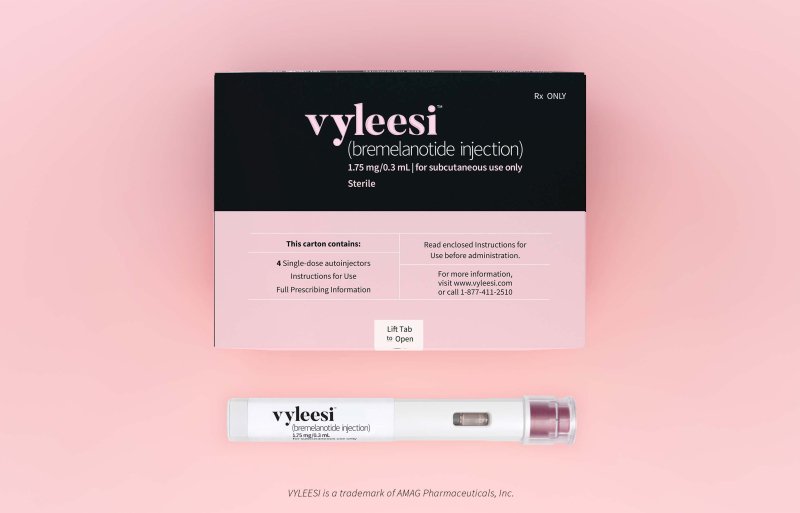
Valeant, now Bausch Health, paid $ 1 billon in 2015 for Sprout Pharmaceuticals’ female libido drug Addyi, only to sell it back in 2017. Now as the drug is still nowhere near the blockbuster status Valeant once touted, a rival has arrived.
The FDA late Friday approved AMAG Pharmaceuticals’ Vyleesi (bremelanotide) to treat premenopausal women with hypoactive sexual desire disorder (HSDD), which is marked by distress caused by low sexual desire.
Could this be the “female Viagra” by sales that Sprout’s Addyi never turned into? AMAG management sure hopes so, but analysts aren’t so optimistic.
During an interview with FiercePharma prior to the approval, AMAG’s president and CEO William Heiden declined to put a number on the company’s internal peak sales estimate. But during an investor day presentation in May, he said 1% market penetration could translate into $ 35 million in revenues per year, given that the disease affects 1 in 10 premenopausal women, or about 5.8 million in the U.S., by the company’s estimate.
By that math, Vyleesi can reach blockbuster heights if can obtain 30% penetration. But the drug might only be able to get 5% at best in 2027, Barclays’ analyst Balaji Prasad figured in a June 17 note to clients. By 2025, the drug could generate revenues of $ 108 million, assuming an annual price of $ 600, he said. Piper Jaffray analyst Christopher Raymond, in his note in May, also said “we do not have high expectations for the asset.”
Using Viagra as an analog for his counter argument, Heiden said the market for male sexual dysfunction didn’t take off until there was an ideal product.
“Today, it’s a market where doctors are actively diagnosing, patients are actively having conversations, the stigma has gone away, it all started with an effective and safe treatment option,” he said. “We think that’s what we’re bringing to market with Vyleesi.”
Vyleesi targets the melanocortin 4 receptor to restore sexual desire. In its two phase 3 trials, dubbed Reconnect, on a combined 1,200 patients, the drug showed a clinically meaningful and statistically significant improvement in the co-primary endpoints, low sexual desire and distress, which are both self-reported by patients.
RELATED: Valeant admits defeat on Sprout, trading $ 1B buy for 6% royalty on a drug that’s not selling
For one thing, AMAG argues Vyleesi boasts a better safety profile than Addyi. Besides the chaos at Valeant and the back-and-forth with Sprout, Addyi’s commercial failure can be attributed to a Black Box warning that limits its use when women are drinking alcohol. An FDA safety program related to that risk also put an extra burden on prescribers and pharmacists. With some postmarketing data, Sprout called for the warning’s full removal. But the agency wasn’t convinced, having just recently revised the warning to forbid alcohol use within two hours before taking Addyi.
In comparison, Vyleesi has no known alcohol interactions, according to AMAG. But it has raised what Chief Medical Officer Julie Krop characterized as a “tolerability issue.”
In the phase 3 studies, about 40% of women experienced nausea at some point, and 13% needed remedy from medication for the symptom. But Krop was quick to point out that very few patients, or 8%, dropped out of the study due to nausea. “I think what that speaks to really is the strong efficacy of the product,” she said. And, after completion of the six-month trial, about 80% of patients decided to enroll in a one-year extension study, which she also attributed to the significant benefit of Vyleesi.
“What we want to balance as we commercialize Vyleesi is to make patients aware that they may experience some mild to moderate nausea,” Heiden told FiercePharma.
Heiden played down the fact that Vyleesi is an auto-injector, versus Addyi as a pill, calling it a “fairly low barrier.” The device hides the needle in a small compartment and takes less than two seconds to administer, he said.
Vyleesi also boasts one advantage over Addyi in that it’s an on-demand therapy, so patients don’t need to be exposed to it all the time, Krop said. In comparison, Addyi comes as a daily treatment.
“What we have found through market research is that patients who suffer from sexual dysfunction actually prefer a drug that they can take in anticipation of sexual activity,” Heiden said, adding that in its clinical trials, women usually use Vyleesi two to three times a month.
Still, after noticing transient increases in ambulatory blood pressure in a previous study, the FDA wanted to see Vyleesi’s effect on blood pressure if taken daily, a demand that pushed back its decision date by three months. And now, the FDA is restricting the drug’s use in people at high risk for cardiovascular disease and requires patients take no more than eight doses per month.
AMAG plans to make the drug available around September and will unveil its price tag in the coming weeks, Heiden said. To kick things off, the company has started the unbranded campaign website unblush.com, offering women a place to talk about and find information on HSDD. And with one promoted post on Instagram, it had in the first week 2.8 million impressions and 80,000 click throughs, according to Heiden. A team of 124 sales reps who are currently promoting other AMAG women’s health products—Feraheme, Intrarosa and Makena—will also reach out to OBGYNs about Vyleesi.
Editor’s Note: The story has been updated with FDA restrictions on Vyleesi.
